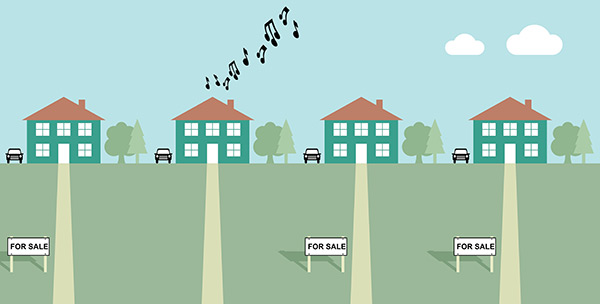Housing – Should I Rent or Buy?
Moving within America is pretty easy, especially since Americans usually leave lighting fixtures and appliances like dish washer, range, sometimes even washer and dryer behind. Back in Germany, where I come from, people don’t move that often, but when they do, they pack up everything – literally. The whole place is getting stripped including lighting fixtures and if the kitchen is easy enough to remove, they’ll take that out, too.
Here in the U.S. it’s much more relaxed and people don’t strip the whole place just to install everything in their new place. They just leave certain things behind, because the new house or apartment will already have the essentials installed and ready to use. And if something is missing or not in great working condition anymore, like a fridge, you just buy a new one. If you can’t afford a new one, you finance it. Not that I would recommend it, but retail stores make it very easy to finance almost everything.
Now, when you just moved to America from another country, the very first thing you do is find a place to stay. Smart immigrants like yourself already researched a good location with short commute to work, availability and how much it costs. Done in advance over the internet, so that a lease can be signed on the first day or after a short stay in a hotel until everything has been taken care of. If you haven’t done your homework, your first step would be to check into a hotel until you find an apartment or house that suits your needs.
There are 7 main factors to consider, that will help you decide what kind of housing will be best for you:
Money
There are a variety of choices: Apartments, trailers, town homes, single family homes, etc. It’s all about the money and how much you have saved up or can afford to spend on rent or mortgage each month. It starts with a few hundred dollars a month for renting a very small apartment and can go up to a couple of thousands each month, if you have to pay down a mortgage. The city and state you’re in also is a major financial factor. While $1,000 a month will barely be enough for a tiny apartment in New York City, where you basically have one room with kitchen and bath all together, you could live like a king in rural areas just outside of NYC. You would also struggle to find a house in San Francisco for under $500,000 while you could buy a mansion for this money in a small town in California. You get the idea.
However, your credit history is most likely not established yet. Even worse, you might not have any history yet, so getting a mortgage on a house could be a little tricky unless you make a tremendous down payment. Some banks will probably need you to come up with a minimum down payment of 25% percent or more. They don’t know you, they can’t check your credit history, because it’s non-existent, so it’s difficult to judge if you will be a good borrower that pays back the mortgage every month in full and on time.
Apartments are a lot easier to get even without a credit history, but the landlords may require a few months of rent in advance as a security deposit. They also like for you to sign a lease contract for a minimum of a year, but that varies.
Length of Stay
Have you been transferred from your employer to the United States for just a few months or maybe 1 or 2 years? Is it maybe tied to your visa status that could be for 3 to 5 years? Or did you get a green card and can theoretically stay as long as you want. These factors and your personal plans are important whether to rent an apartment or buy a house. Generally, I would recommend to always rent an apartment at first, just because you aren’t familiar enough with this area and buying a house is a big decision. That buys you time to explore and plan your next move. If your USA journey is limited to 1 or 2 years right from the start, buying a house will probably not be the best idea, because you’ll have to sell it fast once it’s time to go back. Look into renting a house instead, if you need more space.
Single or Family
Did you bring your spouse, kids and even pets with you? Then it might be worth looking into houses right from the start. You will need a lot more space and large apartments cost as much as a mortgage for a nice single family home. With pets involved you also might run into issues with a landlord at an apartment complex. Sometimes pets are not allowed at all, other times it’s limited to a certain kind. Renting a house or townhouse would be a good option for you with more space than an apartment. Townhouses come with some benefits like apartment complexes, and that is that you don’t have to worry about the lawn, because the landlord will take care of that for you.
Employer Incentives
Based on your contract, there may be the incentive that your employer pays for your housing. That is the best case scenario, because they probably already arrange a place for you that is close to the company and they took care of all the paperwork for you in advance. You just get the key after your arrival and move in. If you’re still negotiating about the terms of your transfer, this might be something worth bringing up. Employers don’t always offer this automatically, but it’s worth asking for. The worst that can happen is that they say no.
Work Commute
The work commute is something that gets easily overlooked, especially if you just look at Google maps while doing internet research. But even if you get a room in a hotel first to have more time for house/apartment hunting, what most people usually do is checking out places during the day and on weekends. Smart house hunters get up early in the morning on a weekday and experience the rush hour and how much it extends your work commute. A commute of 15 minutes on weekends can easily become 60 minutes during rush hour, and probably the same amount in the evening when you’re driving home. That’s 2 hours of sitting in the car being frustrated that you’re wasting your time and regretting that you did not take this into consideration when looking for places to stay.
If you’re in a big metropolitan area like Chicago or San Francisco, you might want to check out public transportation as another option to get to work faster. In some big cities you may not even want to drive a car, because you would end up spending hours driving short distances. In rural areas you might not have a choice but drive a car, because public transportation is pretty bad or non-existent.
Anyway, distance to work should be very high on your priority list. And if you are the only working member of your family, you should have a bigger say in that. Your partner will probably look at other factors, but you’re the one that will be stuck in traffic 5 days a week. So speak up early enough.
Convenience
In America everything comes down to convenience. Do you like mowing your own lawn or would you rather prefer somebody else taking care of that for you? Is access to a pool and gym in walking distance high on your priority list or do you not mind driving somewhere for it? Do you like to fix things in the house yourself or are you anything but a handyman and would like to just delegate it to somebody else?
Convenience can be a big factor when you’re trying to decide between an apartment and a house. A townhouse is kind of in between with more space and some of the amenities that an apartment complex comes with.
If none of the above applies to you and you could go either way, you may want to read on and learn about your future neighbors.

Neighbors
Neighbors in apartments can be pretty awful sometimes, especially when they are noisy. Most apartment walls in the U.S. are very thin and you are going to hear almost everything from your neighbors left and right and below and above you. Maybe try to get a corner apartment or one on the top floor to decrease the noise level of your neighbors.
Disrespectful neighbors are one of the most annoying issues that you can have in an apartment, because you can’t just call the apartment manager to send somebody to fix it. They will maybe send a friendly reminder to your neighbor, but that’s pretty much all they are willing to do and frankly, they don’t really have a lot of options and usually other problems to deal with. So it all comes down to you dealing with your neighbor yourself, which is often times the best solution. Stay away from joining the game by making noise when your neighbor is quiet just to pay him back. This won’t end well and will leave you even more frustrated than before. Knock on their door and kindly mention that you would appreciate if they could be a little more quiet during night-time, because you work hard and have to sleep. Noisy neighbors are what made my wife and I buy a house at a pretty bad time just when the housing market collapsed. We overpaid but it was all worth it to us, because we did not have to deal with this kind of neighbors anymore.
The walls in single family homes however are pretty thin too, and depending on how far apart your neighboring houses are, you might still hear some noise every now and then. However not as bad as in an apartment. Townhouses can potentially be quite as bad as apartments, because you always share at least one side of the house with another unit. At least you don’t have anybody below or above you, but you might end up in between two noisy neighbors.
Research potential apartments and houses as much as you can. Drive by at different times of the day and night and just listen. Also check for air traffic that can be on and off. Sometimes everything appears to be very quiet and harmonic until you hear the deafening horn of a train nearby. Yes, they do honk in America, with a passion.
Photo credit: © tibori, Barry Barnes – Fotolia.com










Leave a Reply